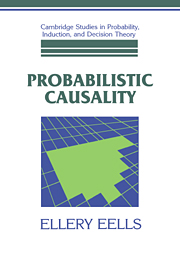Book contents
- Frontmatter
- Contents
- Preface
- Introduction
- Chapter 1 Populations and probability
- Chapter 2 Spurious correlation and probability increase
- Chapter 3 Causal interaction and probability increase
- Chapter 4 Causal intermediaries and transitivity
- Chapter 5 Temporal priority, asymmetry, and some comparisons
- Chapter 6 Token-level probabilistic causation
- Appendix 1 Logic
- Appendix 2 Probabilit
- Bibliography
- Index
- Frontmatter
- Contents
- Preface
- Introduction
- Chapter 1 Populations and probability
- Chapter 2 Spurious correlation and probability increase
- Chapter 3 Causal interaction and probability increase
- Chapter 4 Causal intermediaries and transitivity
- Chapter 5 Temporal priority, asymmetry, and some comparisons
- Chapter 6 Token-level probabilistic causation
- Appendix 1 Logic
- Appendix 2 Probabilit
- Bibliography
- Index
Summary
In the past 30 years or so, philosophers have become increasingly interested in developing and understanding probabilistic conceptions of causality – conceptions of causality according to which causes need not necessitate their effects, but only, to put it very roughly, raise the probabilities of their effects. This philosophical project is of interest not only because the problem of the nature of causation is itself so central in philosophy, and not only because of the nature of causation as well as physical indeterminism in current scientific theory. The theory of probabilistic causation also has applications in other philosophical problems, such as the nature of scientific explanation and the nature of probabilistic laws in a variety of sciences, as well as the character of rational decision. And the theory has applications in these areas whether or not determinism is assumed. In this book, however, very little is said about such applications. I focus on the theory of probabilistic causation itself.
In philosophy, the development of the probabilistic view of causality owes much to the work of I. J. Good (1961–2), Patrick Suppes (1970), Wesley Salmon (1971, 1978, 1984), and Nancy Cartwright (1979) (as well as others). In this book, I articulate and defend a conception of probabilistic causation that owes much to, but differs in important details from, the work of these and other authors. I also examine and appraise several alternatives to the ideas advanced here.
- Type
- Chapter
- Information
- Probabilistic Causality , pp. 1 - 21Publisher: Cambridge University PressPrint publication year: 1991

